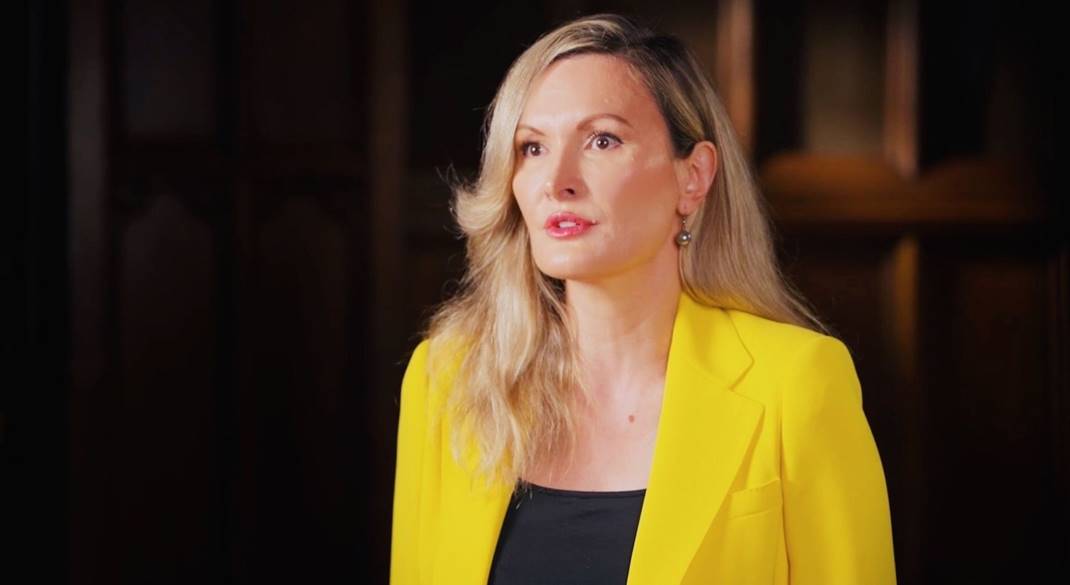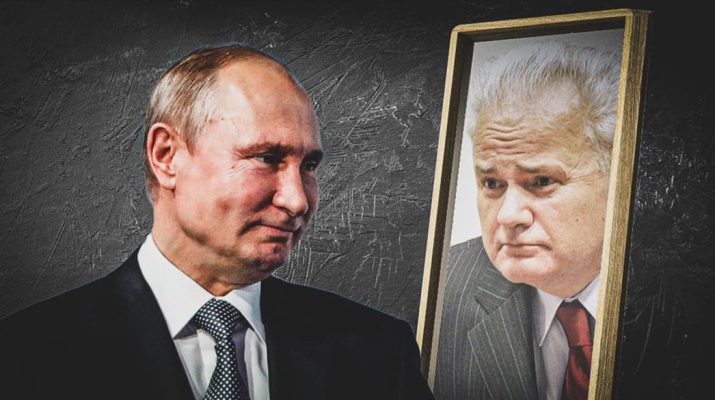Dr. Amra Sabic-El-Rayess: Putin is copying the propaganda playbook of Serbian war criminals

A year ago, Ukrainian soldiers discovered evidence of the Bucha massacre in which Russian forces slaughtered hundreds of Ukrainians in cold blood.
Far from owning up to its crimes, Russia has spent the past 12 months trying to spin the massacre as a Western-inspired conspiracy. The Kremlin said the allegations are a ‘monstrous forgery’ aimed at denigrating the Russian army. This attempt to whitewash the truth has disturbing parallels with the cover-up of atrocities that occurred in my home country, Bosnia, during the 1990s.
There are chilling links between today’s war crimes denialism by Russia and the genocide denialism that continues in Bosnia to this day, over the murder of more than 8,000 Bosniak Muslim men and boys in and around the town of Srebrenica in 1995. In fact, the comparison with the Kremlin’s response is so clear that Russia appears to be acting according to the Bosnian-Serb playbook from that era.
Anti-West conspiratorial narratives, the ruthless crackdown on alternative narratives at home, and the deliberate use of these atrocities to rally domestic support – the similarities are uncanny. But not surprising.
Russia has been a stalwart supporter of Bosnian Serb genocide denialism: in 2015, it vetoed a United Nations security council resolution that would have condemned the Srebrenica massacre as a genocide. Even since the war in Ukraine, Russia maintains strong ties with the Republic of Srpska (the Serb-controlled half of Bosnia). The Republic’s leader Milorad Dodik awarded Vladimir Putin its highest medal of honor last year as recognition for his ‘patriotic concern and love’ for the Bosnian Serbs.
Beneath this alliance, there is a sinister edge. As a Bosnian genocide survivor, what’s most disturbing to me is how Russia is replicating methods Bosnian Serb leaders used to make political mileage from war crimes they caused.
During the war in Bosnia, Serbian-controlled media presented international war crimes claims as evidence of a Western-led conspiracy to unfairly target Serbs for atrocities they did not commit (or that did not happen). That created a siege mentality mindset amongst ordinary Serbs, drawing them closer to the strongman rulers they felt could protect them from the specter of a much larger, more pernicious Western order bent on undermining Serbs at every opportunity.
Through media control and PR spin, these war crimes – far from being the thing that undermined domestic support for the Serb leadership – became the very thing that helped solidify it.
In the Republic of Srpska, this cult of genocide denialism went beyond mere propaganda. The governing authorities set up two commissions to investigate the Srebrenica massacre, one of which concluded that the Bosniak men and boys were killed as a ‘horrific consequence’ of their own refusal to surrender to Bosnian Serb forces. This, of course, took victim-blaming to a whole new level. Radovan Karadzic, the former Serb leader now serving a life sentence for committing genocide, war crimes, and crimes against humanity against Bosnian Muslims also argued that Bosnian Muslims shelled their own people and killed their own people with snipers.
In its invasion of Ukraine, Russia to has used uncannily similar tactics, repeatedly blaming the victims for its atrocities, accusing Ukraine of shelling its own cities and murdering its own POWs.
To this day, war criminals are worshipped by some Serbs. This is not, of course, because Serbs have some innately flawed moral compass – but probably as a result of the effectiveness of propaganda efforts of the 1990s. Consider the thousands that turned out in support of Bosnian Serb leader, Radavan Karadzic when he was finally arrested in 2008 for his involvement in orchestrating the Bosnian genocide. This showed, all too clearly, that many Serbs continued to support Karadzic.
Similarly, today’s Russian propaganda around atrocities like Bucha and others (over which the International Criminal Court issued an arrest warrant for Putin two weeks ago) could – perversely – be one of the factors that strengthen the Kremlin’s domestic support. In addition, it might also become a tool that allows foreign governments to morally justify continued support for the pariah state.
It’s vital, then, that the West does not lose control of the communications war in the Ukraine-Russia conflict as we did during the Bosnian war – the impact of which is still felt today as white supremacists across the Western world celebrate the likes of war criminal Radovan Karadzic.
Already, pro-Russian disinformation posts around the Bucha massacre on Facebook are more popular than posts revealing the truth of what happened.
Unlike the nineties though, the internet has made it possible to engage people at all levels. The web is, of course, a tool for those who wish to spread disinformation. But it is also an invaluable outlet to counter this Russian fake news offensive.
That reality has even caused the US military to change its playbook. President Joe Biden’s administration went against protocol to publicly announce Russia was about to invade Ukraine one week before it happened. That intelligence revelation was part of a broad tactic on the part of the US military to expose Russia’s strategies and get ahead of disinformation campaigns before they even begin.
That reflects a new attitude and culture to combating and pre-empting disinformation. Countering the Russian propaganda machine is immensely difficult. After all, it’s easier to fabricate facts than to authenticate them. But certain steps – like directly engaging the Russian people through strategic transatlantic campaigns, collaborating more effectively with Western-run tech companies, and sending more resources to help Ukraine counter Russian propaganda on the ground – could make all the difference in shaping Russians’ views of what is unfolding in Ukraine.
Stories like mine, and stories from Bucha, cannot be forgotten. Because who – and what – we believe will shape not only the outcome of this disastrous war but the future of Russia itself.
Napomena o autorskim pravima: Dozvoljeno preuzimanje sadržaja isključivo uz navođenje linka prema stranici našeg portala sa koje je sadržaj preuzet. Stavovi izraženi u ovom tekstu autorovi su i ne odražavaju nužno uredničku politiku The Balkantimes Press.
Copyright Notice: It is allowed to download the content only by providing a link to the page of our portal from which the content was downloaded. The views expressed in this text are those of the authors and do not necessarily reflect the editorial policies of The Balkantimes Press.

